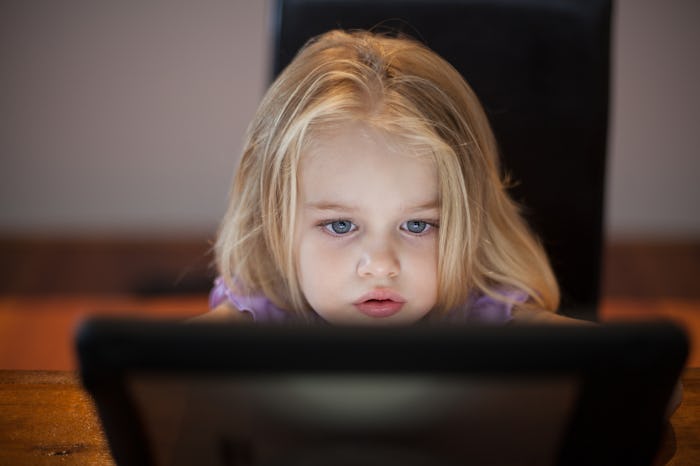Life

How Playing With Screens Impacts Kids Later In Life
For many parents, cell phones and tablets have been a fantastic addition to their parenting repertoire. Maybe you can get your grocery shopping done more easily when your little one is engrossed in an episode of Peppa Pig, or perhaps interactive games have made your long car rides a lot less chaotic. But knowing how playing with screens impacts kids later in life may make you reconsider your child's habits.
First things first: no one is going to tell you to throw your iPads in a fire and parent without any electronics. For most families, some screen time has its place in the daily routine. And according to New Scientist, tablets can indeed promote learning in children, and some kids enjoy learning to read by using interactive media instead of old-school books. Not all screen time is equal in this sense, and interactive, educational games may be helpful for many kids.
That said, there are also some potentially detrimental effects behind too much screen time. Nearly everything about your kid, from his ability to concentrate to his physical and emotional growth, may be affected by the time he spends in front of a phone, tablet, television, or computer. Keep these possible effects in mind so you can choose the best screen time strategy for your family.
1Lack Of Concentraion
Any adult who has struggled to put down her phone and get stuff done in the real world knows just how tempting those devices can become. And as noted in a 2010 publication of Pediatrics, in which 1,323 middle childhood participants were monitored for just over a year, kids who are exposed to video games and television appear to have more attention problems in childhood. That said, parenting in this age of distraction brings up a lot of questions: Do you want to limit your kids' screen time in the hopes of a stronger attention span?
2Lax Brain Development
If you give your toddler access to educational games on a tablet, will this help or harm his brainpower? That question is still being studied. As Dr. Aric Sigman, an associate fellow of the British Psychological Society, said in Psychology Today, lots of screen time "is the very thing impeding the development of the abilities that parents are so eager to foster through the tablets." He further noted that everything from a kid's focus to his communication skills may be hampered by too much time with screens.
3Dulled Empathy
Having empathy for others, or at least understanding that they have a life and mind of their own, is a crucial (and sometimes difficult) concept for kids to master. And as explained in the Journal of Communication, kids who are exposed to a lot of screen time seem to have more trouble developing a theory of mind, or understanding that different people have different emotions and perspectives. Really, nothing can compare to real-life social interaction.
4Missing Social Cues
Learning to read and recognize others' emotions and respond appropriately is a skill like any other. Unfortunately, kids who spend lots of time with screens, instead of interacting with others face-to-face, may suffer socially. However, the results may not be fixed. As a 2014 piece in Computers In Human Behavior explained, preteens who went without screens for five days exhibited a better understanding of nonverbal cues about others' emotions. Perhaps your family may enjoy some time away from all screens on occasion?
5Increased Risk Of Chronic Illness
Lots of time with a TV or tablet could even negatively impact your kid's physical health in some major ways. For instance, according to the American Academy of Pediatrics, lots of screen time may correlate with an increase in childhood obesity. And as noted in Psychology Today, kids who spend lots of time with a TV or tablet may have less cardio fitness and even an increased risk of type II diabetes. Could less screen time help your kids stay more healthy?
6Impacts On Emotional Growth
This factor may be easy to overlook, but kids who are able to fill every spare minute with electronic entertainment may face some problems with their emotional development. “If kids are allowed to play ‘Candy Crush’ on the way to school, the car ride will be quiet, but that’s not what kids need,"Dr. Steiner-Adair, a Harvard-affiliated clinical psychologist, told The New York Times. "They need time to daydream, deal with anxieties, process their thoughts and share them with parents, who can provide reassurance.” Sometimes a lack of stimuli is just what the brain needs.
7Addiction Problems
Loads of adults can't put their phones down for even a minute, so it's no surprise that kids also find this kind of media addictive. A 2014 statement from doctor Dimitri A. Christakis in JAMA Pediatrics noted that technology is advancing faster than researchers can determine its effects on childhood development, so it may be a good idea to limit screen time for kids under two years of age to about a half-hour to one hour each day. As Christakis further explained, it's important that screen time does not interrupt other means of learning and development at this critical age.
8Impeded Self-Regulation
When your baby is still very young, it's important that he learn methods of self-soothing, or ways to calm himself down. However, as explained in Pediatrics, kids who use media as a way to soothe or calm themselves may not learn other means of self regulation. What happens when there's an upsetting moment and the iPad is not within arm's reach?
9Sleep Disruptions
Screens may also damage your child's sleep hygiene. According to KidsMatter.edu, watching exciting content or even just being exposed to the light emissions from a screen may disrupt your kid's sleep habits. Perhaps a printed story book would help your kid power down for bed, and set the stage for years of healthy sleep habits.